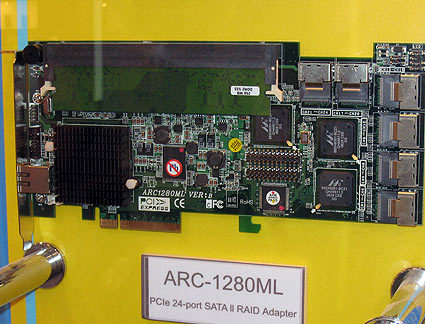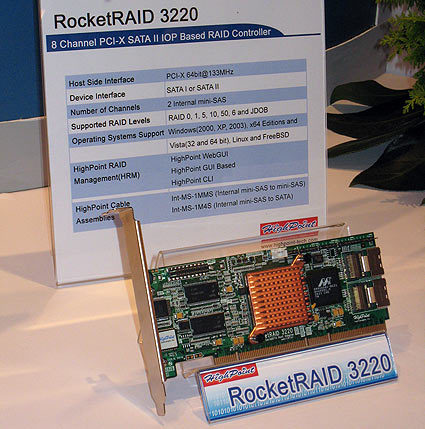Computex 2007: Storage, 4+ GHz Quad Cores and Systems
Areca: 24-Port SATA/300 Über-RAID
Once again Areca wants it all. Areca's product line includes various hardcore controllers for large SAS and SATA RAID arrays. The 1280ML is a 12-port multi-lane SATA/300 RAID adapter for as many as 24 drives; consequently, Areca calls it a Disk Array Adapter. Areca's 1280ML supports up to 2 GB cache memory via a conventional DDR2 DIMM, and it runs all possible RAID modes including RAID 6. It supports capacity expansion and RAID level migration, multiple RAID levels across various drives, SES2 and SGPIO out-of-band management and a comprehensive in-band management solution. Battery backup units are also available and the Firmware Flash is laid out redundantly as well. Note, though, that these cards are far away from fitting into low-profile servers, but they really don't have to.
The company also has redundant SAS RAID controllers, which hook up to drive boxes via multiple connections. If you're interested in these, have a look at the ARC-8100/8200/8300.
HighPoint Showcases 8-Channel SATA RAID 6 Cards
The RocketRAID 3220 is a 133 MHz PCI-X card that has eight Serial ATA II ports. It uses two mini SAS connectors, and utilizes the port multiplier feature of the SATA 2.5 specification. The card supports all popular RAID modes, including 0, 1, 5, 10, 50 and RAID 6 with double redundancy. HighPoint provides drivers for all Windows versions, Linux and FreeBSD.
If you're looking for a PCI Express card, there is the Rocket RAID 3320, which has a PCIe x8 connector. It will run in any x16 slot as well. In contrast to the 3220, the 3320 uses regular SATA ports. Since it is an eight-channel card as well, this is the number of SATA ports you'll find on the board. PCI Express also is popular in Mac systems, so this product is supported with Mac OS X drivers as well.
HighPoint was smart; the company designed the cards with low-profile rackmount servers in mind. The downside is that the 128 MB DDR cache memory is integrated on the controller, though this isn't necessarily bad. The feature set is similar to that of the Accusys card: on the datasheet we found optional battery backup, online capacity expansion, auto rebuild, staggered spin-up for drives and RAID level migration (if you need to turn a RAID 0 array into RAID 5, for example.)
Get Tom's Hardware's best news and in-depth reviews, straight to your inbox.
Current page: Areca: 24-Port SATA/300 Über-RAID
Prev Page Toshiba Slim-Line HD-DVD Burners For Notebooks Next Page NAS Products
